by Ed Lallo/Newsroom Ink
At the age of 65, you would expect to find Jim Gossen sharing an early-morning coffee on the docks with local fishermen near his Grand Isle camp. More often than not you will find him traveling the Gulf coast in his GMC Yukon, working to ensure fishermen and consumers around the country continue to enjoy sustainable Gulf seafood.
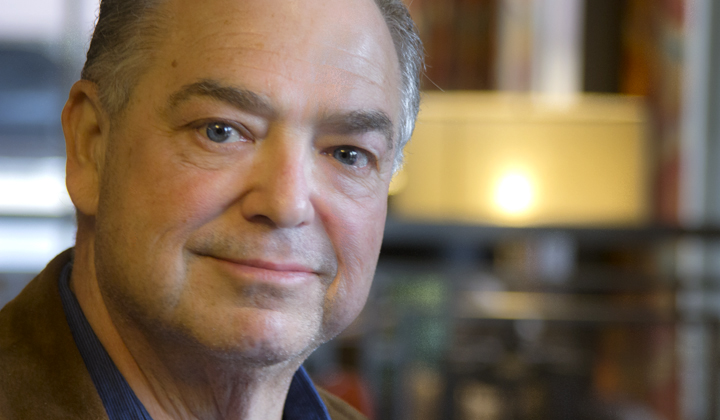
More often than not you will find Jim Gossen traveling the Gulf coast in his GMC Yukon, working to ensure fishermen and consumers around the country continue to enjoy sustainable Gulf seafood. Photo: Ed Lallo/Newsroom Ink
As a Gulf Seafood Institute board member and chairman and founder of Louisiana Foods, Texas’s largest seafood distributor, Gossen still maintains his around-the-clock energy and enthusiasm for seafood, especially Gulf seafood.
“I joined the Gulf Seafood Institute (GSI) because I saw a need for an organization to assist in the management of the resources of the Gulf of Mexico,” explained Gossen on why he got involved with the four month old organization. “It encompasses passionate and knowledgeable experts from a wide variety of seafood backgrounds across five Gulf States. They are dedicated to help charter, commercial and recreational fishermen manage and grow their fair share of the resource.”
A History of Seafood Experience
In August of 2012 he sold Louisiana Foods to industry leader Sysco Foods and the company became Sysco Louisiana Seafood. Terms of the sale included him staying as chairman.
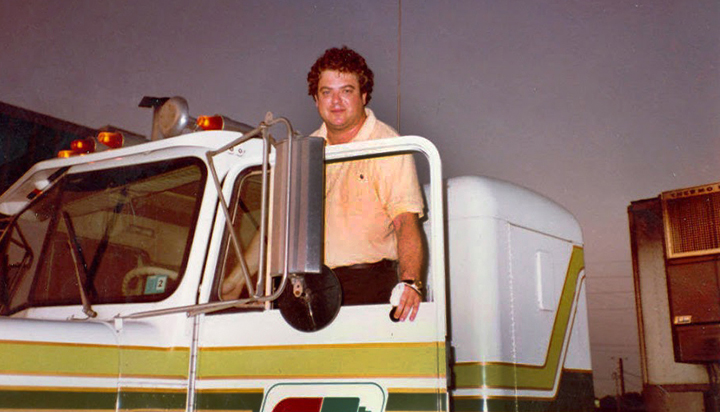
At the age of 30, Jim on one of his trips to pick up food products along with fish, shrimp and oysters in Louisiana. Photo: Gossen Archives
“It was important to me that the culture and employees of Louisiana Foods remained the same,” he explained on why he agreed to stay. “We are known for the best quality of seafood, and I didn’t want that to be lost with the transition.”
Born in Lafayette, La, he grew up working in restaurants. After graduating the University of Louisiana – Lafayette, he helped Bill and Floyd Landry open in Morgan City what would be the first restaurant of many Don’s Seafood’s. The restaurant was the start of a partnership of many years with the Landrys.
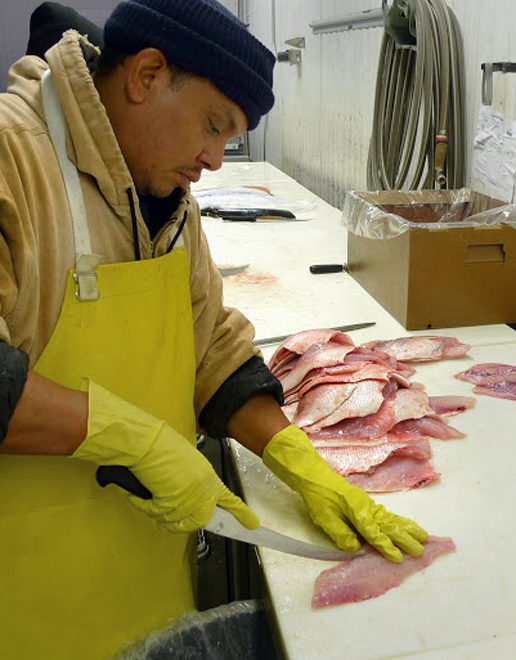
Filleting fish at Sysco Louisiana Foods Stafford plant outside of Houston. Photo: Sysco Louisiana Foods
The Landry family founded Don’s Seafood in Lafayette in 1934. The business expanded to restaurants in Beaumont, TX, Shreveport, Baton Rouge and Morgan City, LA.
“They were big, high-volume seafood restaurants,” said Gossen, “which gave me valuable experience I couldn’t have gotten from school. I saw the need for fresh quality seafood. I had a little pickup truck for the Morgan City restaurant, so in 1972 I started to buy red snapper and shrimp and sell to the other Don’s restaurants and locally to other restaurants.”
In 1975 Gossen moved to Houston to begin opening what would become five successful restaurants and a wholesale seafood company, which he started using that pickup truck.
“We opened Don’s Seafood, Magnolia Bar and Grill, Jimmy G’s, Landry’s and Willy G’s under the Landry’s umbrella, as well as Louisiana Food,” he recalled about the businesses he later sold to Tilman Fertitta and Sysco.
In 1978, Gossen bought a tractor-trailer and started a direct Louisiana – Houston seafood route.
“When I first started Louisiana Foods, 100 percent of the seafood I sold came from the Gulf of Mexico, and most of that from Louisiana,” said Gossen.
“I would drive to Louisiana, sleep in the truck, make pickups from early in the morning until evening, and then drive back to Houston so that the fresh foods could be delivered the next morning,” he explained. “After making the deliveries I would go home and sleep to get ready to do it all over again the next day.”
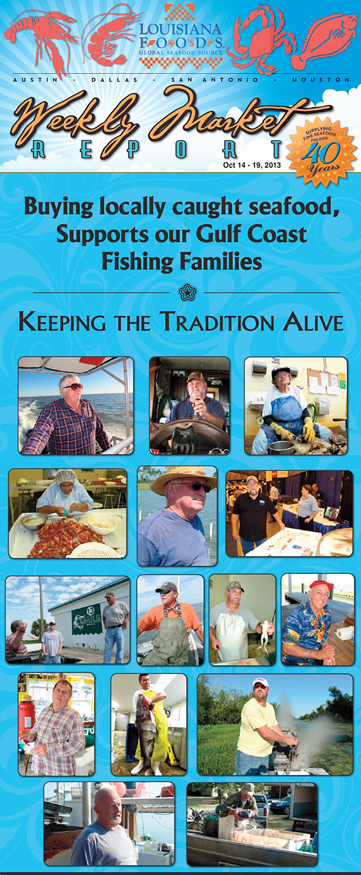 He would bring Leidenheimer French Bread, Camellia Red Beans, boudin, smoked sausage, tasso, Barq’s Root Beer, and stop in Baton Rouge to pick up Community Coffee – “that is how the name started, I was bringing Louisiana to Houston.”
He would bring Leidenheimer French Bread, Camellia Red Beans, boudin, smoked sausage, tasso, Barq’s Root Beer, and stop in Baton Rouge to pick up Community Coffee – “that is how the name started, I was bringing Louisiana to Houston.”
For more than a year and half Gossen would twice a week drive the 1,100-mile trip round-trip, which included two ferryboats. As the company grew, the focus narrowed to strictly seafood.
Sysco Louisiana Foods serves all of Texas, as well as parts of western Louisiana.
“I never wanted to sell seafood that was the cheapest. I wanted to sell seafood that was the best. That is the philosophy, as well as the culture, of the company,” he emphasized.
Gossen has always been very selective about his fishermen and processors. He works closely with those Gulf fishermen and processors that can guarantee the highest quality. Each week he publishes the Weekly Market Report which is read by seafood buyers and chefs around the Gulf.
“When I started in the business, there were no limits on fish caught in the Gulf because frankly the national demand wasn’t there,” he said. “Today, if you don’t have a close relationship with the high-quality fishermen and processors you don’t get the product. I love knowing the whole family and spending time with them in their homes.”
Seafood Business A Partnership
For him the seafood business is a working partnership among fishermen, processors and marketers. Gulf seafood can’t compete on price in the open marketplace, and he feels fishermen shouldn’t try. Gulf fishing communities need to change how they do business or the whole seafood industry could be lost.
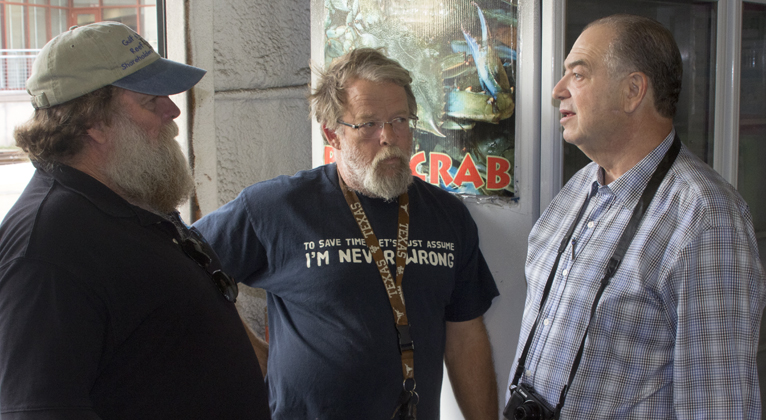
Texas fisherman Buddy Guindon (l-r) and his brother Kenny listen closely to Gossen at their dockside seafood store. Photo: Ed Lallo/Newsroom Ink
“To be successful we have to compete on quality,” said the Houston executive. “We have some of the best seafood in the world coming out of the Gulf of Mexico. We need to help fishermen learn to fish more efficiently, keep seafood fresher and deliver higher-quality seafood to the marketplace.”
By doing so he believes fishermen will reap higher profits so the next generation will say: “I want to become a fisherman.” If the next generation of fishermen can’t make a good living, fishing communities along the Gulf will continue to disappear as they have in the last forty years.
Better fishery management of the Gulf’s resources is what fishermen need, not more government regulations. Gossen, whose relatives have worked in the oil industry, worries that Gulf States are not preparing adequately for the future.
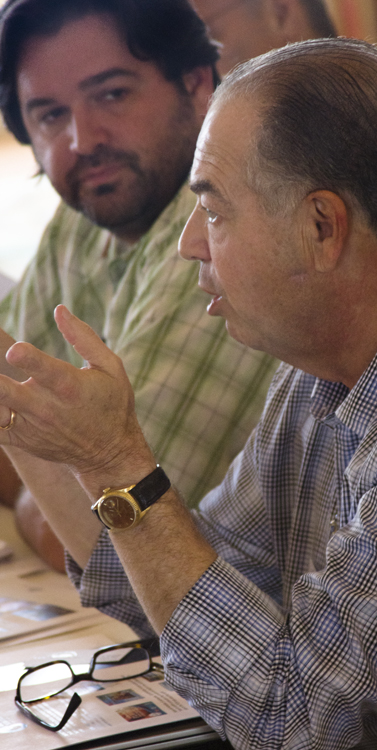
Bryan Caswell (left), chef and owner of Houston’s Reef Restaurant, and Gossen served as moderators for a day long Gulf of Mexico Foundation event for chefs and fishermen in Galveston. Photo: Ed Lallo/Newsroom Ink
“I love the oil industry,” he said. “They have been fantastic for the economy of the Gulf, but what happens when the supply runs out and rigs go away? We need to start now to nurture our source for renewable seafood. If we don’t, we are going to lose a culture I know I don’t want to live without.”
The Gulf of Mexico is a fertile source for seafood like no other. A recipient of the Environmental Protection Agency’s Gulf Guardian Award, he sees a need for creative management of the Gulf much the same way farmers manage their land – rotate crops, farrowed land and keep a constant vigil for unforeseen circumstances.
“If we saw fertile land twice the size of Texas producing fabulous crops slowly disappearing, wouldn’t we do something about it?” he asked. “I think we need to concentrate our efforts on preserving the Gulf, it’s our ‘money tree’ beneath the sea.”
“I see the Gulf Seafood Institute as an umbrella giving all stakeholders involved in the Gulf a place to discuss issues from conservation, to fishery management to the Gulf’s culture,” said Gossen. “Organizations might not all be on the same page, but each organization is important to the survival of the Gulf. Varied opinions are important, and GSI is the place where various voices can be heard.”
Everything affecting the Gulf is out of sight, under water. It is important to realize the Gulf has to be managed in a responsible manner. People need to ask themselves: “How much would we miss Gulf seafood if it was not available?”
Gossen believes consumers would miss it a lot. “I know I don’t want this to happen. I don’t want to be eating seafood from China or Vietnam. That’s just not the future I want.”